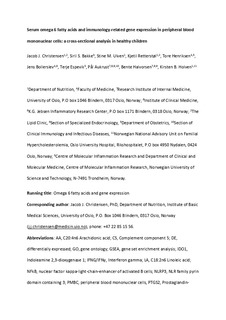Serum Omega-6 Fatty Acids and Immunology-Related Gene Expression in Peripheral Blood Mononuclear Cells: A Cross-Sectional Analysis in Healthy Children
Christensen, Jacob J.; Bakke, Siril Skaret; Ulven, Stine Marie; Retterstøl, Kjetil; Henriksen, Tore; Bollerslev, Jens; Espevik, Terje; Aukrust, Pål; Halvorsen, Bente; Holven, Kirsten Bjørklund
Journal article, Peer reviewed
Accepted version

View/
Date
2019Metadata
Show full item recordCollections
Abstract
Scope
Some studies suggest that a high dietary intake of omega‐6 fatty acids is pro‐inflammatory. However, whether omega‐6 fatty acids actually cause pathogenic inflammation in humans is debated. Therefore, the associations between expression of immunology‐related genes in peripheral blood mononuclear cells (PBMCs) and serum total omega‐6 PUFA status are investigated.
Methods and results
Serum fatty acid profile and expression of 460 immunology‐related genes in PBMCs from 58 healthy children (6–13 years) is measured, and examined the expression differences between children with high or low total omega‐6 PUFA status (upper vs lower tertile). Taken together, both univariate analyses and integrated omics analyses support that while high omega‐6 PUFA level associated with higher expressing of genes related to innate immune responses, it also associated with lower expression of several genes related to adaptive immune responses.
Conclusion
Omega‐6 PUFA status associated both positively and negatively with expression of specific immunology‐related genes in PBMCs in healthy children. The results may suggest a nuanced role for omega‐6 fatty acids in the interphase of lipids and inflammation, and warrants further examination in gene‐environment studies and randomized controlled trials.